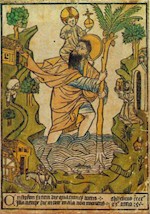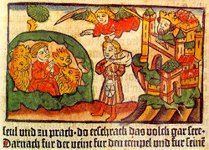Incunabula collection

The St. Christopher Woodcut, 1423
4,500 items.
The Library has fifteen block-books and a number of block-prints, including the St Christopher Woodcut, the only surviving example of the first piece of European printing bearing a date, 1423 (see illustration, right). Of the collection of incunables, 3,000 come from the Spencer Collection, 215 were bequeathed by Richard Copley Christie, and the remainder have been acquired from other sources. Approximately 1,000 are of German origin, about 2,000 were printed in Italy and the remainder represent the presses of other European countries and of England.
Of the earliest type-printed documents to which a place or date can be assigned there are the Letters of Indulgence of Pope Nicholas V, the 36- and 42-line Bibles, the first three Mainz Psalters and in all about 50 productions of the Mainz press associated with Gutenberg, Fust and Schöffer, several being the only recorded copies. The Library has the only complete examples in Britain of books printed by Albrecht Pfister in Bamberg. The work of over 100 German presses is represented in the Collection.

Hand-coloured woodcut of Daniel in the Lions' Den, from the Historie von Joseph, Daniel, Judith und Esther, printed in 1462 at Bamberg by Albrecht Pfister.
In Manchester there are 66 volumes printed by Sweynheym and Pannartz, the first printers in Italy working in Subiaco and Rome between 1465 and 1473. It is the most complete collection in the country, lacking only the Aristotle and Perottus of 1473. 253 printers working in nearly 50 different Italian towns are represented on the Library's shelves. There are 349 volumes printed in Rome (329 separate editions) and these include 39 items printed by Ulrich Han. Of particular importance is Han's 1467 edition of the Meditationes of Cardinal Turrecremata, the only copy in the country of the first Italian illustrated book. Venetian incunables total 576 volumes (485 separate editions), with 42 printed by Vindelinus de Spira and 43 by Nicholas Jenson. Other Italian towns for which significant numbers of incunables are available include Milan (125 volumes, 111 separate editions of which 30 were printed by Zarotus), Florence (110 volumes, 93 separate editions), and Naples (100 volumes, 96 separate editions). The 49 volumes of 44 separate editions printed in Brescia are of particular importance as ten are not available elsewhere in Britain, and five items, the work of Thomas Ferrandus, are unique.
There are some 30 examples of the first Parisian printers, Gering, Friburger and Crantz, and about 100 other examples of the work of other printers in the French capital. French provincial printers are also well represented, particularly those of Lyon and Toulouse, a unique item from the latter town being the 1488 edition of Aesop with Spanish text, issued by Johannes Parix and Stephan Cleblat.
Some twenty Spanish incunables are in the Library, together with a significant number of items originating in the Low Countries including William Caxton's first book (and the first book ever printed in English), The Recuyell of the Histories of Troye (Brugge, ?1473).
The English incunables include over 60 Caxtons of which 36 are complete and unsophisticated, and four are unique, constituting the second largest such collection in the world. Other English printers well represented include John Lettou, William de Machlinia, Richard Pynson, Julian Notary, the Schoolmaster printer of St Albans, and Wynkyn de Worde, the copy of whose 1498 edition of Morte Darthur is unique; the Library also has one of the only two surviving copies of the Caxton edition of Morte Darthur.
Approaching three-quarters of the incunables date from before 1480. "Ephemera" include advertisements (Strasbourg, Mentelin, c.1471; Westminster, Caxton, c.1477), and the only surviving wood block used to print a block-book, an as yet unidentified variant edition of the Apocalypse.
Finding aids
Recorded in general printed-book catalogue and on the Incunabula Short Title Catalogue (ISTC) database. See also Bibliography above.


